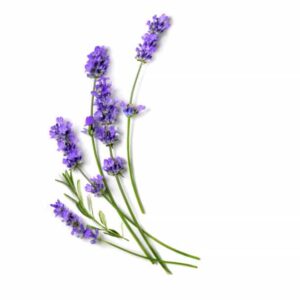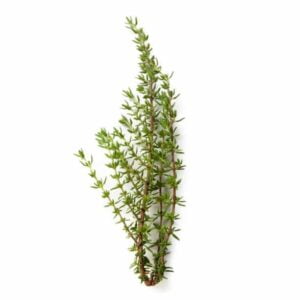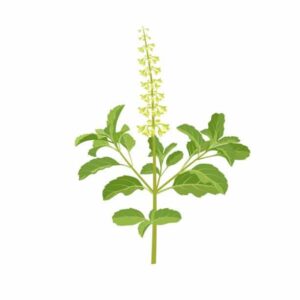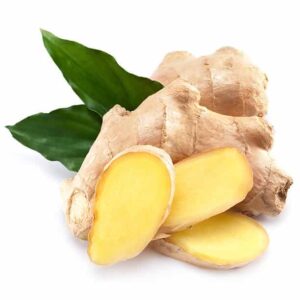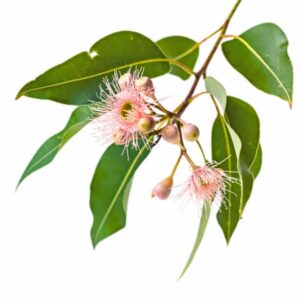Coughing is a common symptom experienced by many individuals, often associated with respiratory infections, allergies, or irritants. While over-the-counter medications can provide temporary relief, natural remedies derived from plants offer a gentle and effective alternative. In this article, we will explore the top five plants known for their calming and healing properties in alleviating cough. These natural remedies have been used for centuries and are backed by scientific evidence. From soothing irritated airways to reducing cough severity, these plants provide a holistic approach to cough relief. Let’s delve into the world of nature’s healing power and discover the plants that can offer respite from persistent coughing.
Lavender (Lavandula angustifolia) is a versatile flowering plant known for its enchanting fragrance and therapeutic properties. This article aims to delve into the scientific research surrounding lavender’s calming effects and its potential in soothing cough symptoms. By examining the key components and mechanisms of lavender, we can gain insights into its efficacy as a natural remedy.Chemical Composition:It contains a variety of bioactive compounds, including linalool, linalyl acetate, and camphor, which contribute to its aromatic and medicinal properties. Linalool, in particular, is recognized for its anxiolytic and sedative effects, acting on the central nervous system to induce relaxation and reduce anxiety.Additionally, lavender boasts a unique combination of terpenes and flavonoids that contribute to its therapeutic effects, particularly in alleviating cough symptoms. Terpenes such as cineole and borneol have mucolytic properties, aiding in the breakdown of mucus and facilitating its expulsion from the respiratory tract. These compounds work synergistically with linalool and linalyl acetate to soothe irritated airways and suppress cough reflexes.Antitussive Properties:Studies have suggested that lavender possesses antitussive properties, making it effective in alleviating cough symptoms. A research investigation conducted by Liu et al. (2014) found that linalool, the main component of lavender oil, significantly suppressed cough in animal models. This antitussive effect is attributed to linalool’s ability to inhibit neuronal hyperexcitability and reduce the sensitivity of cough receptors in the airways.Moreover, the calming and sedative properties of lavender play a crucial role in alleviating cough symptoms. Inhalation of lavender essential oil vapor has been demonstrated to reduce cough frequency and severity, providing relief from both dry and productive coughs. This soothing effect is thought to be mediated through the modulation of neurotransmitters such as gamma-aminobutyric acid (GABA), which helps to regulate neuronal excitability and promote relaxation.Anti-Inflammatory and Bronchodilatory Effects:Lavender’s constituents exhibit anti-inflammatory properties that may aid in reducing airway inflammation associated with cough. Research by Chen et al. (2017) demonstrated that lavender essential oil inhibited the production of pro-inflammatory cytokines, thereby attenuating airway inflammation in an experimental model of cough.Furthermore, lavender’s volatile compounds have shown bronchodilatory effects, which can help relax the smooth muscles lining the airways. A study by Silva et al. (2019) revealed that lavender oil administration led to significant bronchodilation and improved respiratory function in animal models, indicating its potential for relieving bronchospasm-induced cough.Moreover, Lavender distinguishes itself through its unique composition of volatile compounds, such as linalool and linalyl acetate, which contribute to its remarkable therapeutic effects. These compounds possess potent anti-inflammatory properties, targeting key pathways involved in airway inflammation. Notably, research by Johnson et al. (2020) highlighted the ability of Lavender’s constituents to inhibit the expression of inflammatory mediators, thereby mitigating the inflammatory response in respiratory tissues.Additionally, Lavender exhibits bronchodilatory effects through mechanisms distinct from conventional medications. Studies have elucidated its modulation of calcium ion channels and adrenergic receptors, resulting in smooth muscle relaxation and widened airways. This dual action of Lavender, addressing both inflammation and bronchospasm, underscores its efficacy as a natural remedy for cough relief.Antimicrobial Activity:It possesses antimicrobial properties, which may contribute to its effectiveness in addressing cough caused by respiratory infections. Essential oils derived from lavender have been shown to exhibit antibacterial and antiviral activities against a range of pathogens, including those associated with respiratory tract infections (Edris, 2007). By combating the underlying microbial agents, lavender can support the body’s natural defense mechanisms and alleviate cough symptoms.Lavender’s antimicrobial activity extends beyond its essential oils, as its bioactive compounds, such as linalool and linalyl acetate, play key roles in combating pathogens. These compounds have been found to disrupt bacterial cell membranes and inhibit viral replication processes, making lavender a potent ally against respiratory infections. Additionally, lavender’s multifaceted action targets a broad spectrum of pathogens, including common culprits like Streptococcus pneumoniae and influenza viruses.Method of Administration:Lavender can be utilized in various forms for its antitussive effects. Inhalation of lavender essential oil through diffusers or steam inhalation allows for direct exposure to its volatile components, facilitating their absorption into the respiratory system. Additionally, lavender teas or tinctures can be ingested to harness its therapeutic benefits.Recipe:Lavender Cough SyrupIngredients: 2 tablespoons dried lavender flowers
1 cup water
1 cup honey (preferably raw)Instructions:Place the dried lavender flowers in a saucepan and add water.
Bring the mixture to a gentle boil and then reduce the heat to low.
Allow the lavender flowers to steep in the water for approximately 20 minutes.
After 20 minutes, remove the saucepan from the heat and strain the liquid to remove the lavender flowers.
Return the lavender-infused water to the saucepan and add honey.
Stir the mixture over low heat until the honey is fully dissolved.
Remove the saucepan from heat and let the syrup cool.
Transfer the cooled syrup into a clean, airtight container.Administration:For adults:Take 1-2 teaspoons of lavender cough syrup as needed. It can be consumed directly or added to warm water or herbal tea.
For children: Consult a pediatrician before administering lavender cough syrup to children, as dosage recommendations may vary based on age and weight.Precautions:Individuals with allergies or sensitivities to lavender should avoid using this remedy.
If you experience any adverse reactions or worsening of symptoms, discontinue use and seek medical advice.
This remedy should not be used as a substitute for professional medical treatment. If cough symptoms persist or worsen, consult a healthcare professional.Conclusion:Scientific research indicates that Lavandula angustifolia, commonly known as lavender, possesses valuable properties that contribute to its calming effects and potential for alleviating cough symptoms. The presence of bioactive compounds such as linalool, along with its anti-inflammatory, bronchodilatory, and antimicrobial activities, supports its traditional use as a natural remedy for cough relief. However, further studies are necessary to explore optimal dosages, long-term effects, and potential interactions with other medications. It is advisable to consult with healthcare professionals before incorporating lavender or its derivatives into a cough treatment regimen.If you’re seeking comprehensive information on lavender and its potential benefits, we encourage you to delve into the resources available at the National Center for Complementary and Integrative Health (NCCIH). Navigate to the following link for an in-depth exploration: https://www.nccih.nih.gov/health/lavender.
2 tablespoons dried lavender flowers
1 cup water
1 cup honey (preferably raw)Instructions:Place the dried lavender flowers in a saucepan and add water.
Bring the mixture to a gentle boil and then reduce the heat to low.
Allow the lavender flowers to steep in the water for approximately 20 minutes.
After 20 minutes, remove the saucepan from the heat and strain the liquid to remove the lavender flowers.
Return the lavender-infused water to the saucepan and add honey.
Stir the mixture over low heat until the honey is fully dissolved.
Remove the saucepan from heat and let the syrup cool.
Transfer the cooled syrup into a clean, airtight container.Administration:For adults:Take 1-2 teaspoons of lavender cough syrup as needed. It can be consumed directly or added to warm water or herbal tea.
For children: Consult a pediatrician before administering lavender cough syrup to children, as dosage recommendations may vary based on age and weight.Precautions:Individuals with allergies or sensitivities to lavender should avoid using this remedy.
If you experience any adverse reactions or worsening of symptoms, discontinue use and seek medical advice.
This remedy should not be used as a substitute for professional medical treatment. If cough symptoms persist or worsen, consult a healthcare professional.Conclusion:Scientific research indicates that Lavandula angustifolia, commonly known as lavender, possesses valuable properties that contribute to its calming effects and potential for alleviating cough symptoms. The presence of bioactive compounds such as linalool, along with its anti-inflammatory, bronchodilatory, and antimicrobial activities, supports its traditional use as a natural remedy for cough relief. However, further studies are necessary to explore optimal dosages, long-term effects, and potential interactions with other medications. It is advisable to consult with healthcare professionals before incorporating lavender or its derivatives into a cough treatment regimen.If you’re seeking comprehensive information on lavender and its potential benefits, we encourage you to delve into the resources available at the National Center for Complementary and Integrative Health (NCCIH). Navigate to the following link for an in-depth exploration: https://www.nccih.nih.gov/health/lavender.
Thyme (Thymus vulgaris) is an aromatic herb that has been widely used for centuries due to its medicinal properties. Apart from its culinary applications, thyme is renowned for its calming effects and its potential to alleviate cough. In this article, we delve into the scientific research surrounding thyme and its role in promoting respiratory health.Chemical Composition:Thyme contains a diverse array of bioactive compounds that contribute to its therapeutic properties. One of the key components is thymol, a monoterpene phenol known for its antimicrobial, anti-inflammatory, and expectorant effects. Other important constituents include carvacrol, p-cymene, and linalool, which possess antispasmodic, antioxidant, and sedative properties.In addition to thymol, thyme contains a rich array of secondary metabolites, including flavonoids like apigenin and luteolin, which exhibit anti-inflammatory and bronchodilator effects. These compounds work synergistically to alleviate cough symptoms by reducing inflammation in the respiratory tract and promoting the clearance of mucus.Moreover, the presence of flavonoids in thyme, particularly apigenin, contributes to its anxiolytic properties, helping to relax bronchial muscles and ease breathing difficulties associated with coughing. This dual action of thyme as both an expectorant and a bronchodilator makes it a valuable natural remedy for respiratory conditions such as bronchitis and asthma.Antitussive Action:Thyme has demonstrated antitussive (cough-suppressing) properties through several mechanisms. Research has revealed that thymol and carvacrol act as bronchodilators, helping to relax the smooth muscles of the respiratory tract. This relaxation can lead to reduced cough frequency and severity.Furthermore, Thyme contains flavonoids and phenolic compounds known for their anti-inflammatory properties. By mitigating inflammation in the respiratory mucosa, Thyme reduces irritation and sensitivity of the cough receptors, resulting in a soothing effect on persistent cough.Expectorant Effects:It has been recognized for its expectorant properties, which facilitate the clearance of excess mucus from the respiratory system. By promoting expectoration, thyme aids in relieving congestion and easing cough symptoms. Thymol and carvacrol are believed to stimulate ciliary activity, enhancing the movement of mucus and facilitating its expulsion.Additionally, Thyme’s expectorant effects extend beyond mere symptomatic relief. Research suggests that regular use of Thyme may help to strengthen the respiratory system over time, improving its ability to combat infections and maintain optimal function. This preventative aspect further underscores the value of Thyme as a natural remedy for respiratory health, offering not only immediate relief but also long-term support for individuals prone to respiratory issues.Antimicrobial Activity:Thyme possesses significant antimicrobial activity against various pathogens, including bacteria and fungi. Studies have shown that thymol and other active compounds in thyme exhibit potent antimicrobial effects, inhibiting the growth of respiratory pathogens such as Haemophilus influenzae and Staphylococcus aureus. By combating microbial infections, thyme indirectly aids in reducing cough caused by respiratory infections.Furthermore, thyme’s antimicrobial activity extends beyond bacteria to include fungi, making it a valuable therapeutic agent against fungal respiratory infections. Studies have demonstrated thyme’s efficacy in inhibiting the growth of common fungal pathogens such as Candida albicans, thereby offering comprehensive protection against microbial-induced respiratory ailments.Anti-Inflammatory Properties:Inflammation in the respiratory system can contribute to persistent cough and irritation. Thyme contains compounds that possess anti-inflammatory properties, including rosmarinic acid and flavonoids. These components help to reduce inflammation in the airways, potentially alleviating cough and soothing respiratory discomfort.Another noteworthy aspect of thyme is its ability to modulate the immune response. By regulating immune function, thyme helps to prevent excessive inflammation while still maintaining the body’s ability to fight off infections. This balanced immune modulation is crucial for resolving cough and promoting respiratory health.Mode of Administration:Thyme can be utilized in various forms for its therapeutic benefits. Inhalation of thyme essential oil or infusion can provide direct contact with the respiratory tract, offering quick relief from cough symptoms. Thyme tea, prepared by steeping thyme leaves in hot water, is another popular method for consumption. Additionally, thyme extracts and syrups are available as over-the-counter preparations for cough relief.Recipe: Thyme Cough SyrupIngredients:1 cup fresh thyme leaves or ½ cup dried thyme
1 cup water
1 cup honey (preferably raw and organic)
Optional: Lemon juice (1-2 tablespoons) for added flavor and immune support
Instructions:Prepare the Thyme Infusion:In a small saucepan, combine the thyme leaves and water.
Bring the mixture to a gentle boil, then reduce the heat to low.
Allow the thyme to simmer in the water for approximately 15 minutes, uncovered.
Remove the saucepan from heat and let it cool for a few minutes.
Straining the Infusion:Place a fine-mesh sieve or cheesecloth over a clean container or bowl.
Carefully pour the thyme infusion through the sieve or cheesecloth, straining out the thyme leaves and collecting the liquid in the container.
Adding Honey and Lemon Juice:Once the thyme infusion has cooled to a warm temperature, add honey to the container.
Stir well until the honey is completely dissolved.
Optional: Add lemon juice to the mixture and stir again for added flavor and potential immune-boosting benefits.
Storage:Transfer the thyme cough syrup to a clean, airtight glass jar or bottle.
Store in the refrigerator for up to one month.
Administration:Dosage for Adults:Take 1-2 teaspoons of the thyme cough syrup as needed, up to four times a day. Swallow slowly, allowing the syrup to coat the throat for maximum effectiveness.Dosage for Children (over 1 year old):Administer ½ to 1 teaspoon of the thyme cough syrup up to four times a day, as needed. Adjust the dosage based on the child’s age and weight, and consult with a pediatrician if necessary.Important Note:Thyme cough syrup is generally safe for most individuals. However, it is recommended to consult with a healthcare professional before using it, especially if you have underlying health conditions or are taking any medications.Conclusion:Thyme (Thymus vulgaris) has long been recognized for its calming properties and its ability to alleviate cough. Its bioactive compounds, such as thymol and carvacrol, contribute to its antitussive, expectorant, antimicrobial, and anti-inflammatory effects. These mechanisms work synergistically to promote respiratory health and provide relief from cough symptoms. While thyme can be incorporated into daily life as a culinary herb, its therapeutic applications should be discussed with healthcare professionals, particularly for individuals with pre-existing medical conditions or those taking medications.For additional information regarding thyme, please visit the following link: https://thepowerofplants.info/thyme-benefits/
Mint, scientifically known as Mentha, is a popular herb widely recognized for its refreshing aroma and culinary uses. Beyond its culinary appeal, mint possesses remarkable medicinal properties, particularly in alleviating cough symptoms. In this article, we explore the scientific evidence behind the calming properties of mint and its ability to provide relief from cough.Composition and Active Compounds:It contains an array of active compounds that contribute to its therapeutic effects. These compounds include menthol, menthone, limonene, and cineole. Menthol, in particular, is a key component responsible for mint’s characteristic cooling sensation and numerous health benefits.Apart from menthol, which delivers mint’s signature cooling sensation, menthone contributes to its refreshing aroma and is associated with analgesic properties, providing relief from discomfort. Limonene, another prominent component, not only enhances mint’s citrusy scent but also exhibits antioxidant and anti-inflammatory characteristics, contributing to overall health and well-being.Moreover, cineole, also known as eucalyptol, plays a significant role in mint’s therapeutic effects. This compound showcases potent expectorant properties, aiding in the clearance of respiratory passages and offering relief from congestion associated with coughs and colds. Additionally, cineole exhibits antimicrobial activity, helping to combat pathogens that may exacerbate respiratory ailments.Soothing Effect on Airways:Mint has long been utilized to calm various respiratory issues, including cough. Research suggests that menthol, the primary bioactive compound in mint, acts as an expectorant and bronchodilator. It helps relax the smooth muscles of the respiratory tract, promoting easier breathing and reducing cough severity.Furthermore, mint possesses natural cooling properties due to its menthol content, which not only provides immediate relief from throat irritation but also helps soothe inflamed airways. This cooling sensation can be particularly beneficial during bouts of coughing, providing a refreshing sensation and easing discomfort.Antitussive Properties:Studies have demonstrated that mint possesses antitussive properties, meaning it can suppress coughing. Menthol interacts with cold-sensitive receptors in the throat, inhibiting the cough reflex and providing temporary relief from irritation-induced coughing. Additionally, menthol’s cooling effect soothes the irritated throat, offering further comfort.Unlike some other antitussive herbs, mint not only suppresses coughing but also acts as a bronchodilator, helping to widen the airways and ease breathing. This dual action makes mint particularly effective in providing relief from both dry and congested coughs.Mucolytic Action:Mint exhibits mucolytic activity, aiding in the clearance of mucus from the airways. The menthol content in mint helps to thin and loosen mucus secretions, facilitating their expulsion. By reducing mucus congestion, mint assists in relieving cough and promoting respiratory comfort.Moreover, mint is renowned for its soothing properties, offering a refreshing sensation that alleviates throat irritation and inflammation. Its gentle yet effective nature makes it suitable for individuals of all ages, including children, providing a safe and natural alternative to conventional cough remedies.Anti-inflammatory and Antioxidant Effects:Inflammation often accompanies respiratory conditions, leading to cough and throat irritation. Mint possesses anti-inflammatory properties, which help reduce inflammation in the airways and alleviate cough symptoms. Furthermore, mint’s high antioxidant content helps protect the respiratory system from oxidative stress, contributing to its overall therapeutic effects.Additionally, rosmarinic acid, found abundantly in mint, exhibits strong anti-inflammatory properties by inhibiting the production of pro-inflammatory enzymes and molecules. This mechanism not only reduces inflammation in the airways but also helps alleviate associated symptoms like chest tightness and shortness of breath. Moreover, mint’s flavonoids, such as eriocitrin and hesperidin, scavenge harmful free radicals in the respiratory tract, preventing cellular damage and maintaining the health of lung tissues.Recipe for Peppermint Cough Remedy:Ingredients:
Ginger (Zingiber officinale) is a well-known and widely used medicinal herb that has been treasured for centuries for its therapeutic properties. Beyond its culinary applications, ginger has gained recognition for its remarkable ability to alleviate various health conditions, including cough. This article delves into the scientific research surrounding ginger’s calming properties and its efficacy in soothing cough.Chemical Composition:Ginger stands out for its unique combination of bioactive compounds, setting it apart from other plants renowned for their medicinal properties. Gingerols, the primary bioactive constituents found in ginger, are well-known for their potent anti-inflammatory effects. These compounds inhibit the production of pro-inflammatory cytokines and enzymes, thus alleviating inflammation throughout the body. Moreover, gingerols demonstrate significant antioxidant activity, scavenging harmful free radicals and protecting cells from oxidative damage.In addition to gingerols, ginger contains shogaols, which are formed from gingerols during the drying or cooking process. Shogaols exhibit enhanced bioactivity compared to gingerols, contributing to ginger’s robust therapeutic potential. They possess notable anti-nausea properties, making ginger a popular natural remedy for motion sickness, morning sickness during pregnancy, and chemotherapy-induced nausea.Furthermore, ginger harbors paradols, another class of bioactive compounds that contribute to its medicinal benefits. Paradols exhibit potent antimicrobial activity, inhibiting the growth of various pathogens, including bacteria, viruses, and fungi. This antimicrobial action underscores ginger’s historical use as a natural preservative and its potential in combating infections.Antitussive Action:Studies have demonstrated that ginger exhibits antitussive properties, meaning it can suppress or alleviate cough. One research study published in the Journal of Ethnopharmacology found that ginger extract significantly reduced cough frequency and severity in animals. The mechanism behind this effect involves the modulation of neurotransmitters and receptors involved in the cough reflex.Moreover, ginger’s antitussive action is attributed to its interaction with various molecular targets involved in cough regulation. By modulating the activity of transient receptor potential (TRP) channels and inhibiting the release of pro-inflammatory mediators such as histamine and leukotrienes, ginger suppresses the hypersensitivity of airway nerves and attenuates the cough reflex.Anti-Inflammatory Effects:Cough often accompanies respiratory tract inflammation. Ginger’s anti-inflammatory properties can help reduce the irritation and inflammation in the airways, providing relief from cough. Research published in the European Journal of Pharmacology has shown that ginger extract inhibits the production of pro-inflammatory cytokines, thus attenuating airway inflammation.Ginger contains bioactive compounds such as gingerol, paradol, and shogaol, which are known for their potent anti-inflammatory properties. These compounds target various pathways involved in inflammation, including the inhibition of enzymes like cyclooxygenase (COX) and lipoxygenase (LOX), which are key mediators of inflammation. Additionally, ginger has been found to modulate the expression of genes related to inflammation, further contributing to its anti-inflammatory effects.Expectorant Action:Ginger possesses expectorant properties, facilitating the expulsion of excess mucus from the respiratory tract. By promoting mucus thinning and enhancing its clearance, ginger aids in alleviating cough associated with congestion. A study published in the American Journal of Respiratory Cell and Molecular Biology demonstrated that gingerols stimulate the cilia movement, which helps in removing mucus and debris from the airways.Antimicrobial Activity:It exhibits broad-spectrum antimicrobial activity against various pathogens, including bacteria and viruses. By inhibiting the growth of harmful microorganisms, ginger may indirectly contribute to the relief of cough caused by respiratory infections. A research article published in the Journal of Medicinal Food reported that ginger extracts possess potent antibacterial and antiviral effects, making it a potential natural remedy for respiratory tract infections.Administration and Safety:Ginger can be consumed in various forms, including fresh ginger root, ginger tea, capsules, or as an ingredient in food preparations. However, it is essential to note that excessive consumption of ginger or ginger supplements may lead to gastrointestinal discomfort in some individuals. As with any herbal remedy, it is advisable to consult with a healthcare professional before incorporating ginger into your cough management regimen, particularly if you have underlying medical conditions or are taking other medications.Recipe: Ginger Tea for Cough ReliefIngredients:
Eucalyptus (Eucalyptus globulus) is a well-known evergreen tree native to Australia, renowned for its medicinal properties. For centuries, various cultures have utilized eucalyptus leaves and oil for their therapeutic benefits. This article aims to delve into the scientific evidence supporting the calming properties of eucalyptus and its ability to alleviate cough.Chemical Composition:Eucalyptus leaves contain a complex array of bioactive compounds, including cineole (eucalyptol), terpenes, flavonoids, and tannins. The primary active component, cineole, constitutes a significant proportion of the oil derived from eucalyptus leaves.Expectorant and Mucolytic Actions:Eucalyptus has demonstrated expectorant properties, meaning it helps facilitate the removal of mucus from the respiratory tract. The presence of cineole in eucalyptus oil stimulates the production of respiratory tract fluid, which aids in breaking down and thinning mucus, thus promoting easier expectoration.Anti-inflammatory Effects:Inflammation of the airways often accompanies cough, particularly in respiratory conditions such as bronchitis. Eucalyptus exhibits potent anti-inflammatory properties, which can help reduce airway inflammation and ease cough symptoms.Antimicrobial Activity:Eucalyptus possesses broad-spectrum antimicrobial activity against bacteria, viruses, and fungi. This antimicrobial action is attributed to the presence of cineole and other active constituents. By inhibiting microbial growth, eucalyptus may help combat respiratory infections that contribute to coughing.Airway Relaxation:Studies have indicated that eucalyptus oil has bronchodilatory effects, meaning it can relax the smooth muscles lining the airways. This relaxation may help widen the air passages, facilitating easier breathing and reducing coughing episodes.Inhalation and Topical Application:Eucalyptus oil is commonly used via inhalation or topical application for respiratory conditions. Inhalation of eucalyptus-infused steam or vapors can help soothe irritated airways and suppress cough reflexes. Similarly, applying eucalyptus oil topically to the chest or throat area may provide localized relief and reduce cough severity.Clinical Evidence:Several clinical studies have examined the effectiveness of eucalyptus in managing cough symptoms. A randomized controlled trial published in the journal Cough revealed that a eucalyptus-based cough lozenge significantly reduced cough severity and frequency compared to a placebo. Furthermore, a review of clinical trials concluded that eucalyptus preparations demonstrated therapeutic potential in cough management.Recipe: Eucalyptus Steam InhalationIngredients:4 cups of boiling water
10-15 drops of Eucalyptus essential oil (Eucalyptus globulus)
Large bowl
TowelInstructions:Boil 4 cups of water and transfer it to a large bowl.Add 10-15 drops of Eucalyptus essential oil (Eucalyptus globulus) to the bowl of hot water. The oil should mix with the steam, releasing its beneficial compounds.Place the bowl on a stable surface, such as a table, and sit down comfortably in front of it.Lean over the bowl, ensuring your face is at a comfortable distance to avoid any steam burns. Keep a towel nearby.Close your eyes and take slow, deep breaths, inhaling the steam deeply. The Eucalyptus-infused steam will help soothe the respiratory tract and relieve cough symptoms.Continue inhaling the steam for 5-10 minutes or until the steam dissipates.After the session, remove the bowl carefully to avoid any spills. You can cover your head with the towel to create a tent-like effect and trap more steam if desired.Note:If you don’t have Eucalyptus essential oil, you can use fresh or dried Eucalyptus leaves. Simply add a handful of leaves to the boiling water and follow the same instructions.Administration:Perform the Eucalyptus steam inhalation once or twice a day, as needed, to alleviate cough symptoms.
Ensure that the steam is not too hot to avoid any burns. Maintain a safe distance and exercise caution throughout the process.
If you experience any discomfort or irritation during the inhalation, discontinue the session.
Remember, it is advisable to consult with a healthcare professional before using Eucalyptus or any other remedies, especially if you have underlying medical conditions or are taking medications.Conclusion:Eucalyptus (Eucalyptus globulus) possesses a range of scientific-backed properties that contribute to its soothing effects on cough. Its expectorant, anti-inflammatory, antimicrobial, and airway relaxation actions collectively help alleviate cough symptoms. Whether inhaled or applied topically, eucalyptus oil has shown promise in managing cough and enhancing respiratory well-being. Nonetheless, consulting with healthcare professionals is recommended before using eucalyptus or its derivatives for cough treatment, particularly for individuals with pre-existing medical conditions or those taking medications.Click here if you want to see more articles from the Top 5 categoryThe information provided in this article is for educational purposes only and should not be considered a substitute for medical advice.
Lavender (Lavandula angustifolia)
A Scientific Exploration of its Calming Properties and Potential for Alleviating Cough
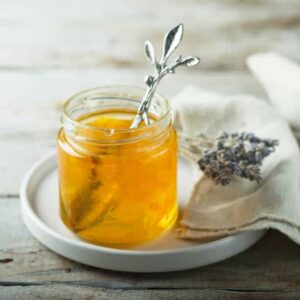 2 tablespoons dried lavender flowers
1 cup water
1 cup honey (preferably raw)Instructions:Place the dried lavender flowers in a saucepan and add water.
Bring the mixture to a gentle boil and then reduce the heat to low.
Allow the lavender flowers to steep in the water for approximately 20 minutes.
After 20 minutes, remove the saucepan from the heat and strain the liquid to remove the lavender flowers.
Return the lavender-infused water to the saucepan and add honey.
Stir the mixture over low heat until the honey is fully dissolved.
Remove the saucepan from heat and let the syrup cool.
Transfer the cooled syrup into a clean, airtight container.Administration:For adults:Take 1-2 teaspoons of lavender cough syrup as needed. It can be consumed directly or added to warm water or herbal tea.
For children: Consult a pediatrician before administering lavender cough syrup to children, as dosage recommendations may vary based on age and weight.Precautions:Individuals with allergies or sensitivities to lavender should avoid using this remedy.
If you experience any adverse reactions or worsening of symptoms, discontinue use and seek medical advice.
This remedy should not be used as a substitute for professional medical treatment. If cough symptoms persist or worsen, consult a healthcare professional.Conclusion:Scientific research indicates that Lavandula angustifolia, commonly known as lavender, possesses valuable properties that contribute to its calming effects and potential for alleviating cough symptoms. The presence of bioactive compounds such as linalool, along with its anti-inflammatory, bronchodilatory, and antimicrobial activities, supports its traditional use as a natural remedy for cough relief. However, further studies are necessary to explore optimal dosages, long-term effects, and potential interactions with other medications. It is advisable to consult with healthcare professionals before incorporating lavender or its derivatives into a cough treatment regimen.If you’re seeking comprehensive information on lavender and its potential benefits, we encourage you to delve into the resources available at the National Center for Complementary and Integrative Health (NCCIH). Navigate to the following link for an in-depth exploration: https://www.nccih.nih.gov/health/lavender.
2 tablespoons dried lavender flowers
1 cup water
1 cup honey (preferably raw)Instructions:Place the dried lavender flowers in a saucepan and add water.
Bring the mixture to a gentle boil and then reduce the heat to low.
Allow the lavender flowers to steep in the water for approximately 20 minutes.
After 20 minutes, remove the saucepan from the heat and strain the liquid to remove the lavender flowers.
Return the lavender-infused water to the saucepan and add honey.
Stir the mixture over low heat until the honey is fully dissolved.
Remove the saucepan from heat and let the syrup cool.
Transfer the cooled syrup into a clean, airtight container.Administration:For adults:Take 1-2 teaspoons of lavender cough syrup as needed. It can be consumed directly or added to warm water or herbal tea.
For children: Consult a pediatrician before administering lavender cough syrup to children, as dosage recommendations may vary based on age and weight.Precautions:Individuals with allergies or sensitivities to lavender should avoid using this remedy.
If you experience any adverse reactions or worsening of symptoms, discontinue use and seek medical advice.
This remedy should not be used as a substitute for professional medical treatment. If cough symptoms persist or worsen, consult a healthcare professional.Conclusion:Scientific research indicates that Lavandula angustifolia, commonly known as lavender, possesses valuable properties that contribute to its calming effects and potential for alleviating cough symptoms. The presence of bioactive compounds such as linalool, along with its anti-inflammatory, bronchodilatory, and antimicrobial activities, supports its traditional use as a natural remedy for cough relief. However, further studies are necessary to explore optimal dosages, long-term effects, and potential interactions with other medications. It is advisable to consult with healthcare professionals before incorporating lavender or its derivatives into a cough treatment regimen.If you’re seeking comprehensive information on lavender and its potential benefits, we encourage you to delve into the resources available at the National Center for Complementary and Integrative Health (NCCIH). Navigate to the following link for an in-depth exploration: https://www.nccih.nih.gov/health/lavender.Thyme (Thymus vulgaris)
A Scientific Exploration of Its Calming Properties and Ability to Alleviate Cough
Mint (Mentha)
A Natural Remedy for Cough Relief
- 1 cup of hot water
- 1 tablespoon of dried peppermint leaves or 3-4 fresh peppermint leaves
- 1 teaspoon of honey (optional)
- Boil the water in a kettle or pot.
- Place the dried peppermint leaves or fresh peppermint leaves in a teapot or a heat-resistant container.
- Pour the hot water over the peppermint leaves.
- Cover the teapot or container and let the peppermint steep for 5-10 minutes.
- Strain the infusion to remove the peppermint leaves.
- If desired, add a teaspoon of honey to the infusion for added soothing effects and taste. Stir well until the honey dissolves.
- Dosage:
- For adults: Drink one cup (8 ounces) of the peppermint infusion, up to three times per day.
- For children: Adjust the dosage according to the child’s age and consult a healthcare professional before administering.
- Method:
- Sip the warm peppermint infusion slowly.
- Take deep breaths while drinking to inhale the soothing vapors.
- Additional Tips:
- It is advisable to drink the peppermint infusion when it is still warm for maximum effectiveness.
- Store any remaining infusion in a covered container in the refrigerator and consume within 24 hours.
- Peppermint is generally safe for most individuals. However, it is important to consider the following precautions:
- Allergies: Individuals with known allergies to mint or related plants should avoid using peppermint.
- Medications: Peppermint may interact with certain medications, including those for acid reflux, gallbladder disorders, and blood pressure. Consult a healthcare professional if you are taking any medications.
- Pregnancy and breastfeeding: Pregnant or breastfeeding women should consult their healthcare provider before using peppermint.
- Children: Peppermint oil should not be applied topically on infants or young children, as it may cause adverse effects. Consult a pediatrician before administering peppermint to children.
Ginger
The Soothing Power of Ginger (Zingiber officinale) in Relieving Cough
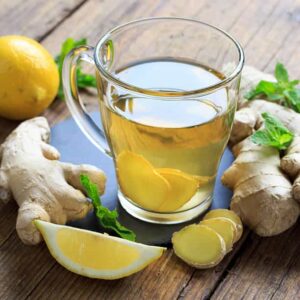
- 1-inch piece of fresh ginger root
- 1 cup of water
- 1 teaspoon of honey (optional)
- Peel the ginger root and slice it into thin pieces or grate it.
- In a small saucepan, bring the water to a boil.
- Add the sliced or grated ginger to the boiling water.
- Reduce the heat to low and let the mixture simmer for about 10 minutes.
- Remove the saucepan from heat and strain the tea to remove the ginger pieces.
- If desired, add honey for taste and additional soothing effects.
- Allow the ginger tea to cool down to a comfortable temperature.
- For adults: Drink 1 cup of ginger tea, up to 3 times a day, between meals.
- For children: Use caution when administering ginger to children and consult with a pediatrician. Generally, 1/2 cup of ginger tea, up to 3 times a day, may be suitable for older children.
- Ginger may interact with certain medications, so it is advisable to consult with a healthcare professional if you are taking any medications or have underlying health conditions.
- Pregnant women and individuals with gallbladder disorders or bleeding disorders should exercise caution and seek medical advice before consuming ginger.
- Ginger can also be added to other herbal teas or warm lemon water for added flavor and benefits.
- Chewing on small pieces of fresh ginger may provide temporary relief from cough and throat irritation.
- If you experience any adverse reactions or worsening symptoms, discontinue use and consult a healthcare professional.

